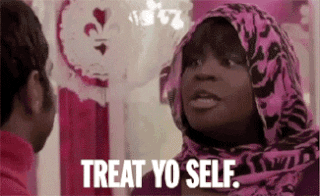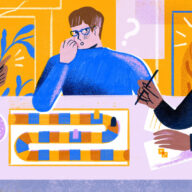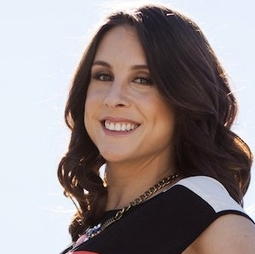Everyone has their own way of looking at the world.
The way you view your world and everything in it (yourself, your job, your relationships, your goals…literally everything) is unique—you’re experiencing it through a lens typically constructed from a mix of your beliefs, experiences, biases, and opinions.
But that lens? It’s not always the clearest way to look at things.
For example, when you encounter a problem you’ve never faced before, you’re not going to have the experience to solve it—so looking at the problem through your unique lens isn’t going to get you any closer to a solution.
And that’s where mental models come in.
Mental models allow you to view the world through more tried, tested, and unbiased lenses, and help find solutions to problems that might be out of your personal sphere of experience.
Not only can they be incredibly helpful in giving you deeper insights into the world around you, they can also be extremely useful at taking your career to the next level.

But what, exactly, are mental models? How do they work? And how can you use mental models to reexamine your own thoughts, beliefs, and behaviors, as well as improve your professional life in the process?
We talked to Thomas Oppong, founder of AllTopStartups and creator of Thinking in Models, a course on how to apply mental models for career growth, to get his expert insights on all things mental models—including which mental models you should adopt to thrive in your career.
What Are Mental Models?
First things first, before we jump into how mental models can completely change your career game, let’s quickly cover what, exactly, mental models are. Thomas Oppong explains:
“I think the basic definition of mental models would be just tools, ideas, principles, and perceptions that we consistently use to solve better decisions or to understand life. So every principle…that we use in our daily lives, either in business, career, or in life, [can be considered] mental models.”
So that lens we were talking about earlier, the unique one through which you view the world?
Think of that as your own, personal mental model. But there are other mental models (or other lenses through which you can view things) that you can apply to specific situations that will give you a deeper level of understanding and insight than you’d be able to pull from your own personal experience. This in turn, can help you make better decisions and easily solve a problem.
I’ll use myself as an example. I’m a writer, and I’m pretty good with words (if I do say so myself). But numbers? Not so much. So, if I was to try to figure out how much I need to save each month in order to comfortably retire 30+ years from now—strictly by using my own background and experience—I wouldn’t even know where to begin ($50 a month, cross my fingers, and hope for the best?).
But luckily, I don’t have to approach that problem through my own lens of experience; there’s a mental model for that!
Compounding is an existing mental model that, when applied to investment situations (like retirement), can be used to calculate how much interest will accrue over a specific period of time.
So instead of banging my head against a wall, trying to figure out how much to put aside each month, I can apply the compounding mental model and voila! Retirement planning problem solved.
 Source: The Motley Fool
Source: The Motley Fool
Simply put, mental models are explanations of how things work.
They guide our thinking, giving us access to these “lenses” or formulas we might not otherwise have had access to, which we can use to supercharge our problem-solving abilities and make the decision-making process easier and faster. Oppong explains:
“Mental models have a lot to offer because…there are so many people who have experimented with different ways to make things better, different ways to make better decisions. And then, they’ve shared these principles [and] ideas with the rest of us.
So, as people in their daily lives continue to find them and apply them, [mental models] shorten the decision process and make it easier for us to even do better or make better assumptions or make better decisions.”
In a nutshell, mental models can help us think beyond our own personal experience and provide a kind of mental “shortcut,” making it easier, faster, and more efficient to find solutions for problems.
What’s The Connection Between Mental Models, Productivity, And Success?
Alright, so now that you know what mental models are, let’s talk about how they work—and, in particular, how they’re connected to your career, success, and productivity
There are a few different ways mental models can help you level up your productivity, get more done, and take your career to the next level, including:
- Cutting down on problem-solving time. Imagine if you had to start from scratch to figure out every problem you encountered during the day? By applying mental models, you can more quickly and easily understand the problem at hand—and, more importantly, get to the best and more productive solution.
- Opening your mind to new and different ways of thinking. As mentioned, we all have our own unique way of looking at things—but sometimes, that unique way of looking at things can hold us back. By applying mental models, you can remove yourself from the equation and approach things from a more objective place. And that willingness to open your mind and see things through a new lens? It’s a key to growth—both personal and professional.“Once you’re open to learning [and using different mental models], you probably would be able to identify your own biases or your own traps or your own mental biases that are preventing you from growing,” says Oppong.
- Helping you become more adaptable. The most successful people are the ones who can roll with the punches and adapt to things as they come. The more mental models you understand, the more you’re able to look at things from a variety of different perspectives—and the more adaptable and flexible you’ll be when solving problems.
The Mental Models That Can Help You Take Your Career To The Next Level
You know what mental models are. You know how they can make you more productive. Now, let’s take a look at the specific mental models you need to adopt to thrive in your career.
Circle Of Competence
The circle of competence mental model was developed by Warren Buffet—and while it was originally used as a way to guide investment decisions, it’s also extremely relevant to business.
Your circle of competence is the areas in which you excel. You should always stick within that circle. If you try to move outside of that circle (and focus on tasks where you have a limited understanding or experience), you’re not going to be as effective—and your productivity will tank as a result.

Source: Farnam Street
So, for example, let’s say you’re the CEO of a startup, and your circle of competence includes pitching investors, mentoring your team, and coming up with big-picture strategies.
If you want your business to succeed, that’s where you need to spend your time; if your focus is on tasks outside of your circle of competence (so, for example, managing budgets or writing social media copy), your productivity is going to suffer—and so will your startup.
Take the time to identify your circle of competence. Ask yourself:
- What am I good at?
- What do I love doing?
- Where do I excel?
Then, spend your time and energy there—and figure out how to get rid of the tasks outside of your circle of competence (for example, by hiring an assistant).
Incentives (AKA Reward And Punishment)
The incentives mental model says that all living things (including humans) are inherently incentive-driven—when you understand this principle, you can apply it to your work and incentivize yourself to get things done.
For example, is there a task on your to-do list that you dread every day? If you respond to more positive incentives (or rewards), you could tell yourself: “If I get XYZ task done by 12pm, I can treat myself to an iced coffee at lunch.”

If you’re the kind of person who responds better to more negative incentives (AKA punishment), you could tell yourself “If I don’t get XYZ task done by 12pm, no iced coffee with lunch today.”
Either way, the reward or punishment is the incentive you need to tackle your dreaded work task, making it easier to get it done—increasing your productivity in the process.
Regret Minimization Framework
Sometimes, the decision that provides a sense of instant gratification isn’t the best or most productive—and that’s where the regret minimization framework comes in.
“One [mental model] that I’ve found to also be very helpful is… the Regret Minimization Framework,” says Oppong.
Developed by Amazon CEO Jeff Bezos, the regret minimization framework allows you to think beyond the present moment and assists in making the best decision for your future.
Oppong explains:
“Whenever you’re taking an action, instead of just making a choice that would benefit you in the short term, you focus on the long term. Long term not just in the next five or ten years but…the next 15 or 20 years.”
This mental model gives you a framework for evaluating your decisions and how those decisions are going to impact your success and well-being in the long term.
So, for example, you get offered a promotion at work, but it would require you to put in longer hours at the office. If you were only thinking about your short-term benefit, you might be tempted to say no (who wants to work late when there’s Netflix to watch?!). But by applying the regret minimization framework, you can assess how the decision is going to impact you in the long-term and come to the realization that, 10 years from now, you’d probably come to regret turning down a promotion for more time with your Netflix queue.
Law Of Diminishing Returns
The law of diminishing returns is defined as “the point at which the level of profits or benefits gained is less than the amount of money or energy invested”—you can use this mental model to maximize your efficiency and make sure you’re getting the most productivity bang for your buck.
The key to successfully using the law of diminishing returns?
Identifying the “point” where the energy outweighs the benefit and making sure to work up to that point, but never past it.
Here’s a great example of the law of diminishing returns: The number of hours you work every day.

Everyone hits a point where the juice is no longer worth the squeeze, where they’re technically “working,” but they’re so mentally exhausted, they’re not actually getting things done.
Identifying the time of day when you hit that point—and working until then, but not a minute after—will help you maximize your productivity every day (without veering into burnout territory).
Fixed And Growth Mindset
According to this mental model, pioneered by Stanford psychologist and researcher Carol S. Dweck in her book, Mindset, there are two ways to view yourself: With a fixed mindset or a growth mindset.
If you have a fixed mindset, you believe who you are—including your skills, talents, and abilities—are set in stone. You are who you are, and really? There’s no changing.
A growth mindset is just the opposite, it’s the belief that your skills, talents, and abilities are constantly evolving. There’s always the possibility for change and, as the name implies, growth.
When you approach your career with a growth mindset, you’ll always leave the door open for new opportunities to learn, grow, and change—no matter how successful you are.
“If you have a growth mindset, then you’ll be able to [grow]…wherever you find yourself, even if you find yourself at the top of the corporate ladder, you will still be able to grow,” says Oppong.
Adopting a growth mindset will not only make for a more successful and productive career—but it will also make for a more exciting one When you’re open to growing, learning, changing, and evolving, who knows where you’ll end up?
Use Mental Models To Skyrocket Success
Everyone has their own way of looking at the world. But mental models allow you widen that perspective and find new, different, and more efficient ways to think and work—which is a key factor in skyrocketing your productivity and career and claiming the success you deserve!








































